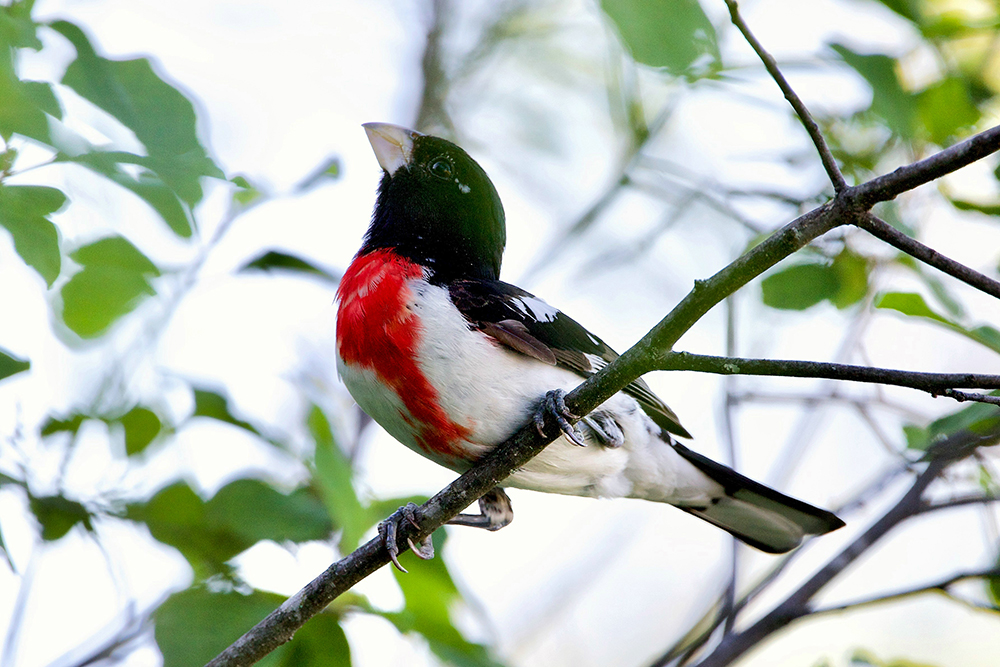“Wow, that is one honking big sparrow,” my wife said, peering out our bedroom window and into the backyard. The bird in question — a mottled, dun-colored songbird — perched on one of our backyard bird feeders, occasionally munching on safflower seeds, and staring into the middle distance in a way that I’m sorely tempted to describe as “uncanny.” It dwarfed the little song sparrows and fox sparrows hopping amid the fallen seeds and shells beneath the feeder.
The next morning, there were more of the birds.
It wasn’t until the red-throated, black-and-white males of the species showed up that we realized we weren’t being invaded by massive sparrows, but were dealing with a different kind of creature altogether. So, after consulting our handy, dandy Birds of Tennessee Field Guide (Adventure Publications), we realized that our backyard had become a migratory pitstop for rose-breasted grosbeaks, on their way south and west from East Tennessee in early autumn.

By this time of year, now that our clocks have fallen back an hour, after the leaves aren’t just turning but falling, the grosbeaks have gone. They’re in Central and South America, far from any, ah, shall we say “North American concerns” that may be troubling the rest of us left behind in Memphis.
This time of year is truly one of change, when the world feels poised on the brink of something, hesitating before the charge into new seasons. Some of those changes are human-made — the grosbeaks, rose-breasted or otherwise, have no use for clocks and time zones and Daylight Saving Time. Their bodies tell them when to fly and where to stop. Elections, though they have far-reaching consequences on the natural world, won’t keep a blue jay or mourning dove up all night, stress-drinking, doom-scrolling, and refreshing a vote count. The raccoons who steal black-oil sunflower seed from my birdfeeders by the fistful are also blissfully ignorant of politics.
Lucky them, right?
There is also the headlong holiday rush from Halloween to New Year’s Eve, and though its onset always leaves me anxiously checking and rechecking my bank balance, it also brings the excitement of friend and family reunions, of kids’ surprised smiles. The Pink Palace Crafts Fair and the Corn Maze give way to the Enchanted Forest and Starry Nights. Zoo Boo precedes Zoo Lights.
Evening shadows lengthen and come sooner, as autumn sunsets yield to lengthening night earlier with each passing day. Fallen leaves crunch underfoot; squirrels scurry from tree to tree, increasingly frantic as winter’s onset draws near. Everything prepares to hunker down for the cold.
I thought about the grosbeaks — and our other seasonal visitors, in spring and autumn both — as I walked this week. The reminder of the natural world, with its reassuring certainty of cycles of warmth and cold, has been a source of comfort and inspiration both. Those polite birds have yet to overstay their welcome. I never worry about the peaceful transition of power from autumn to winter. (Though winter to spring often feels anything but certain when mid-February rolls around, but that’s a topic for another day.)
It seems telling to me that I have yet to reopen Facebook since November 5, 2024, but I feel called to walking trails, parks, and other public greenspaces. Some inner voice, quiet but persistent, is pushing me toward interactions that nourish the soul. In this time of uncertainty, change, and mind-numbing existential dread, I’m especially thankful for that inclination to step outside, instead of reaching for the junk food dopamine hit of social media. The smell of decomposing leaf litter on an urban forest trail is far more palatable to me right now.
If, like me, you have rushed toward natural rhythms as a source of comfort, then I can only say that soon we will have to return the favor for Mother Nature. Even the usually staid AP Times sounds downright alarmist on the impending second term of former President Donald Trump, with a new piece by Jennifer McDermott and Matthew Daly warning that the President-elect’s planned rollbacks could be a serious hurdle to green energy measures. So, to everyone else whose comfort place is Overton Park, I say now is our time to shine. We should look to our local leaders, especially those with environmental experience, like Rep. Justin J. Pearson, recently re-elected to District 86. Memphis Community Against Pollution, Protect Our Aquifer — these folks’ fight is about to get harder, and they need our help.
In the meantime, I’m going to take a walk, crunch some leaves, and touch some damn grass.
Jesse Davis is a former Flyer staffer; he writes a monthly Books feature for Memphis Magazine. His opinions, such as they are, are his own and not the fault of his overworked editor.


